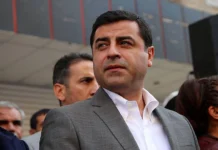Turkish authorities in İstanbul and nine provinces on or near the Syrian border have stopped registering all but a handful of recently arrived Syrian asylum seekers, Human Rights Watch, an international human rights association, announced on Monday.
The suspension is leading to unlawful deportations, coerced returns to Syria and the denial of health care and education.
The European Commission had recently praised Turkey’s asylum system and plans to release the second batch of €3 billion under its March 2016 migration deal which includes support for refugees in Turkey. European Union institutions and governments have stayed publicly silent on the suspension and other refugee abuses committed by Turkey, suggesting their primary concern is to halt the movement of asylum seekers and migrants from Turkey to the EU.
“While the EU supports Turkey to deter asylum seekers from reaching Europe, it’s turning a blind eye to Turkey’s latest steps to block and discourage people fleeing Syria,” said Gerry Simpson, associate refugee program director at Human Rights Watch.
“But forcing Syrians who manage to get past Turkey’s border guards to live in legal limbo only risks driving them underground and onward to the EU.”
The suspension of registration is Turkey’s latest effort to deny new asylum seekers protection. Over the past three years, Turkey has sealed off its border with Syria, while Turkish border guards continue to carry out mass summary pushbacks and to kill and injure Syrians as they try to cross.
Between early 2011 and the end of May 2018, Turkey had registered almost 3.6 million Syrians, making it the world’s largest refugee hosting country. That generosity does not absolve it, or its international partners, of the duty to help newly arrived asylum seekers, Human Rights Watch said.
In mid-May 2018, Human Rights Watch interviewed 32 Syrians in Turkey’s Hatay province about their attempts to register for a temporary protection permit in Hatay, Gaziantep and Istanbul provinces. A permit protects Syrians from arrest and the risk of deportation. It also entitles them to get health care and education, to work, and to seek social assistance, including the EU-funded Emergency Social Safety Net for the most vulnerable Syrians.
Syrians said Turkish police deported them in groups of up to 20 people for not having a permit and that hospitals and schools refused to take them in without permits. Some said they returned to Syria so they, or their relatives, could get urgent medical care. Others said they decided to return to Syria because only some family members had been able to register. All said, they lived in constant fear of arrest and deportation and severely restricted their movement to avoid the police.
Turkey is bound by the international customary law rule of nonrefoulement, which prohibits the return of anyone in any manner whatsoever to a place where they would face a real risk of persecution, torture or other ill treatment, or a threat to life. This includes asylum seekers, who are entitled to have their claims fairly adjudicated and not be summarily returned to places where they fear harm. Turkey may not coerce people into returning to places where they face harm by denying them legal status or access to essential services.
On Oct. 30, 2017 the Hatay Governor’s Office said that to discourage smugglers from helping Syrians enter Turkey through Hatay, the province would no longer register newly arriving Syrians for temporary protection permits. In early February 2018 Turkey’s Interior Ministry said Istanbul province would also no longer register Syrians.
Eight other provinces on or near the Syrian border have also suspended registration for newly arriving Syrians since late 2017 or early 2018, according to three agencies working closely with Syrian refugees, as well as a European Commission official and a Turkish public official who previously worked on migration issues. The provinces are Adana, Gaziantep, Kahramanmaraş, Kilis, Mardin, Mersin, Osmaniye and Şanlıurfa.
Since late August 2015, only registered Syrians who obtain a special travel permit have been allowed to travel within Turkey. In practice, the vast majority of Syrian asylum seekers enter Turkey irregularly through the few remaining gaps in Turkey’s border wall in Hatay province. Blocked from registering there, they are unable to lawfully leave Hatay province and travel to other provinces where registration has not been closed. This forces them to live illegally in Hatay province, or to use smugglers to reach other parts of Turkey, risking arrest and deportation.
According to three confidential sources, Turkey has rejected proposals for a new system that would allow Syrians arriving in Hatay, and to a far lesser extent in other border provinces, to register in other parts of Turkey where fewer refugees live.
Refugee agencies told Human Rights Watch that Turkey’s strict controls on international and local refugee agencies prevent them from finding and helping unregistered Syrians. This lack of aid agency monitoring means that there are no statistics or estimates on the numbers of Syrians denied registration, deported, or refused urgently needed services.
In response to a June 13 letter presenting the Human Rights Watch findings, the migration authorities in Ankara denied that any of the country’s 81 provinces, including Hatay and Istanbul, had suspended registration of Syrians. The United Nations High Commissioner for Refugees (UNHCR) told Human Rights Watch that as of mid-May the authorities had reassured them that registration of Syrians was ongoing, including in Hatay and Istanbul. Other aid agencies that support refugees say that the authorities in the 10 provinces have only continued to process Syrians pre-registered at the time of the suspension and to register urgent medical cases referred from Syria and babies born to registered Syrians in Turkey. Two refugee aid agencies also said that in some cases they have managed to convince the authorities in Hatay and Osmaniye provinces to register particularly vulnerable unregistered Syrians.
In early 2018 the authorities in Hatay opened a new registration center in Antakya. Representatives of three aid agencies and two Turkish security personnel working in Antakya said the center is exclusively for unregistered Syrians to request help to return to Syria, while registered Syrians can request help to return at other migration authority-run centers.
Turkey does not allow any independent monitoring of whether unregistered Syrians signing up for return are in fact returning voluntarily or whether they are effectively being coerced. In contrast, Turkey does allow independent monitoring of some registered Syrians’ decision to return to Syria. (turkishminute.com)















